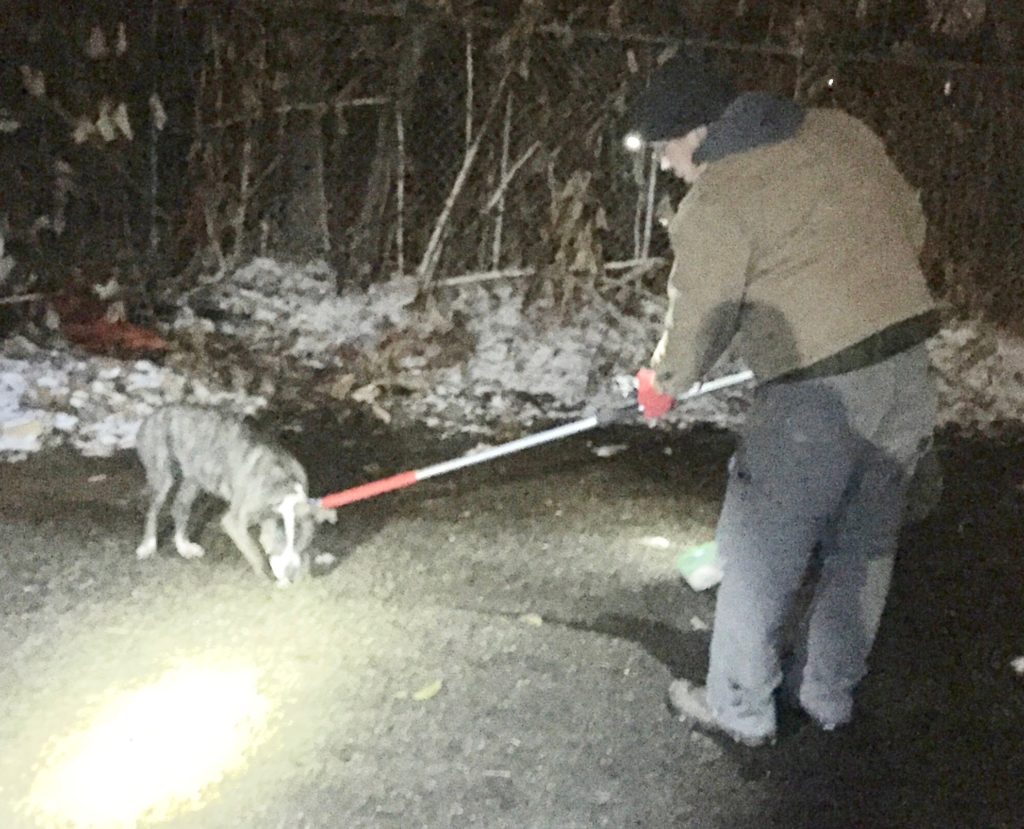By Jessie Wilkie
As a Flint resident, full-time employee, homeowner, taxpayer and animal lover, I am compelled to write about a recent event in the Mott Park neighborhood which relates back to the greater state of animal welfare in the city.
On Sunday, Jan. 5, at around 7 p.m. I was contacted by a local animal rescue organization that I have donated to, fostered for and volunteered with in the past. The rescue needed help capturing a stray dog that had been hiding out in the gated maintenance area of the Mott Park Recreation Area. There had been multiple sightings of the dog for a few days leading up to that Sunday.
It was only when a couple of Good Samaritans saw the dog on Sunday that action took place. The Good Samaritans gave the dog food and water through the fence and reached out to Genesee County Animal Control.
The animal control representative told them Animal Control wasn’t open and thus, couldn’t do anything. They said to try back the next day, Monday, which was funny because they are not open on Mondays, either.
Temperatures over the weekend hovered at or below freezing with snow coating the ground that day. The decision to leave an emaciated dog out in freezing weather without proper shelter was animal cruelty.
That’s when an animal rescuer stepped up and did the right thing. A member of a local animal rescue organization, along with the help of four volunteers, including myself, went out to secure the dog.

Bill Heatley of Streethearts Animal Rescue using a catch-pole to capture the stray dog at the Mott Park Recreation Area (Photo by Jessie Wilkie)
There was snow on the ground, it was dark and freezing out as we surrounded the maintenance area with a perimeter of volunteers. The terrified, emaciated dog was hiding behind some gas tanks. We blocked her exit through a hole in the fence.
If you’ve never been on a street rescue, scared dogs can seem vicious because they growl and their body language is very guarded. These dogs are frightened, not violent, but it takes trained and experienced rescuers to safely secure them. It takes time to get a dog feeling comfortable.
It took us about an hour to get her on a catch pole and then a leash. She was apprehensive but calmed down. We had her secured–now what? The dog had a collar on and she would need to be held for seven days – a period known as a “stray hold.”
By then it was about 9 p.m. I had to work in the morning, but our work was hardly done. Securing the dog was the first step. Now, we had to find a place for her to stay for the night since Animal Control wouldn’t open up for after-hours intake.
I quickly realized that the animal rescue was at capacity, veterinarians’ offices were closed for boarding at this hour, and the other good-natured volunteers weren’t able to commit to housing the dog.
I reluctantly volunteered to hold her for the night. I have a dog in hospice and a cat at home, so bringing in a stray dog meant risking exposing them and myself to germs.
But I thought one night would give the rescue team time to network her and try to find another rescue for transfer. Worst case scenario, she could be transferred to a veterinarian for boarding the next day if no rescue was secured.

Rescued dog in a crate her first night (Photo by Jessie Wilkie)
Holding her for one night bought the rescue some time and provided a safe, warm place for this poor dog. It’s a lot of work to feed, clean up after and take care of a stray dog – even for a day: lots of diarrhea and accidents in the crate that involved thorough cleaning. Not an ideal way to spend a Sunday night, and having to juggle it on Monday with work was stressful. But when the dog warmed up to me and would wag her tail when she saw me coming, it made it all worth it.
I know many people would say, and many did say, don’t do it. You can’t save every animal. Let someone else deal with it. It’s not your problem.
Then, whose problem is it?
In the past, Animal Control during off-hours would still be accessible by police for after-hours intake. Now, Animal Control states that rescuers aren’t supposed to drop off the stray dogs they secure at Animal Control because the facilities are for police and emergency intake. This would suffice in a community with fewer strays, but Flint is brimming with them.
But this brings up the question: what are rescuers who are already at or past their capacity supposed to do with the dogs? Not respond and let them roam the streets uncontained? If anything, experienced rescues should be encouraged, not discouraged, to respond to street calls and assist a burdened police force and understaffed animal control.
This wasn’t the case at the Genesee County Commissioners meeting on Wednesday, Jan.15. Some in attendance said that animal rescuers were accused by representatives of Genesee County Animal Control of skulking around in the night. However, upon reviewing the recording of the meeting it was clear that everyone was working toward the shared goal of ensuring public and animal safety. In reality, it should be animal control officers taking calls for help and not animal rescues, but if Animal Control can’t do the job that taxpayers fund it to do, then I’d rather have experienced rescues out there working hard in the night to help secure animals ensuring public and animal safety.
The problem extends beyond animal control. Flint is a city in a chronic fiscal crisis with an extremely short-staffed police force. The city is burdened with legacy costs for pension plans and retiree healthcare with a shrinking population and diminishing revenue base. With Animal Control only open 28 hours per week and a small police force that is already pushed to its limits, responding to a large volume of calls in a high crime city, it’s clear that this problem isn’t going to solve itself.
In 1935, we saw C.S. Mott and Flint educator Frank J. Manley launch a community schools model that made use of public schools during nonschool hours. Mr. Manley observed that we have schools that are funded by taxpayers but sit empty and unused for most of the year.
This parallels the situation regarding animal control, with facilities funded by taxpayers only open for public intake 28 out of 168 hours per week. [Animal Control is open Tuesday-Friday noon to six, Saturday 10 a.m. to 2 p.m., closed Sunday and Monday–Ed.] SEE NOTE BELOW. It might not be financially viable for the facility to extend full operations to more hours per week, but there should definitely be a way to extend public intake hours and after-hours drop-off.
Instead of putting down the rescue organizations and people who are trying to help animals, I’d love to see the county commissioners and Animal Control figure out a way to serve their taxpaying citizens–taxpaying citizens who include the members and volunteers of these animal rescues. Perhaps it’s something to revisit when the next millage renewal comes up, or to seek another source of funding.
Update from Jessie Wilkie: The dog was held at my house for one night, transferred to a vet for an exam and boarding for one night and then transferred to another rescue to complete the stray hold which is now up, so they will be vetting her and working to adopt her out. She did test heartworm positive, but she might be pregnant. She had an ultrasound last week that was inconclusive so they are doing another one Feb. 1 If no puppies are present, then they will start heartworm treatment.
Contributor Jessie Wilkie moved to Flint from California in May 2017 to participate in the Flint Public Art Project as a resident artist. Inspired by the positive work that was being done, she decided to call Flint home. She now works and lives in the city.
EVM sought a response to this commentary from Genesee County Animal Control director Paul Wallace. He replied, “It appears that you’re being dragged into what this ‘rescue’ group is trying to make a hot-button issue. This isn’t at all what it seems and your writer doesn’t have all her facts straight, but I can’t get into a debate in this forum. I appreciate your chance to respond, but I’m going to pass.” He did correct the statement about Animal Control hours, which had been added in by the editor. The Animal Shelter is open Tuesday-Friday noon to 6 p.m; 10 a.m. to 2 p.m. Saturday, closed Sunday and Monday as indicated above. He added Animal Control officers patrol M-F 8 a.m. to 4 p.m and the shelter is staffed seven days a week because, he said, ” we a) have to be in here to, if nothing else, care for the animals in the shelter b) We will respond 24-7 to actual public safety emergencies.”
The 2017-2018 Animal Control budget was at about $1.8 million–for information on where that money comes from and how it is used, details are available on p. 66 of the Genesee County budget.–Ed.


You must be logged in to post a comment.